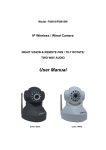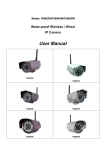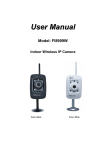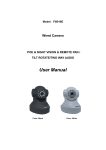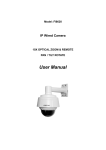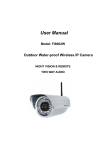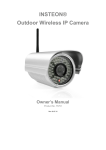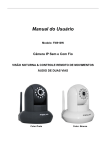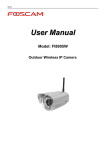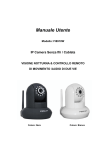Download 1 WELCOME
Transcript
IPCAM User Manual 1 WELCOME IPCAM is an integrated wireless IP Camera solution. It combines a high quality digital video Camera with network connectivity and a powerful web server to bring clear to your desktop from anywhere on your local network or over the Internet. The basic function of IPCAM is transmitting remote video on the IP network. The high quality video image can be transmitted with 30fps speed on the LAN/WAN by using MJPEG hardware compression technology. The IPCAM is based on the TCP/IP standard. There is a WEB server inside which could support Internet Explore. Therefore the management and maintenance of your device become more simply by using network to achieve the remote configuration, start-up and upgrade firmware. You can use this IPCAM to monitor some special places such as your home and your office. Also controlling the IPCAM and managing image are simple by clicking the website through the network. 1.1 Features ● Powerful high-speed video protocol processor ● High-sensitivity 1/4" CMOS sensor ● 300K Pixels ● IR night vision (Range: 30m) ● Optimized MJPEG video compression for transmission ● Multi-level users’ management and passwords definition ● Embedded Web Server for users to visit by IE ●Wi-Fi compliant with wireless standards IEEE 802.11b/g ● Supporting Dynamic IP (DDNS) and UPnP LAN and Internet (ADSL,Cable Modem) ● Giving alarm in cause of motion detection ● Supporting image snapshot ●Support multiple network protocols: HTTP/TCP/IP/UDP/STMP/DDNS/SNTP/DHCP/FTP ● Support WEP/WPA/WPA2 encryption 1.2 Packing List Untie the pack and check the items contained against the following list: z IPCAM×1 z Wi-Fi Antenna×1 (only available for wireless model) z DC Power Supply×1 z Quick Installation Guide×1 z CD×1(Include IPCAM user guide、IP camera tool) z Network Cable×1 z Mounting bracket×1(option) NOTE: Please Contact us immediately in the case of any damaged or short of contents. -1- IPCAM User Manual 1.3 Product views 1.3.1 Front View Figure 1.1 Infrared LED 60 IR LEDs LENS CMOS sensor with fixed focus lens. (12mm) WiFi Antenna Wireless Antenna 1.3.2 Back View Figure 1.2 LAN: RJ-45/10-100 Base T Power: DC 5V/2A Power supply Reset Button: Press and hold down the RESET BUTTON for 30 seconds. Release the power button and IP camera will be reset back to the factory default parameters. 1.4 Preparations before use 1.4.1 Software installation (1) Put the small CD in the CD driver of your computer. Open the CD; find the software as instruction; (2) Double click IPCamSetup.exe and install the software as instruction. -2- IPCAM User Manual Figure 1.3 (3) Only click Next, you will complete the software installation. Figure 1.4 -3- IPCAM User Manual Figure 1.5 The computer restarts upon installation completion and an icon appears on the desktop automatically. NOTE: If you use Windows7 and could not find the icon on desktop after install the IP camera tool, please check if the path of the camera port to is correct. For example, as it was pointing to C:\Windows\System32\IPCamera.exe. Please fix this by pointing the shortcut to the correct path C:\Windows\SysWOW64\IPCamera.exe. After this you could use the shortcut without any problems. CAUTION: Before installing and using the product, please read the following precautions carefully and make sure they are fully understood. Use only the power adapter attached with the product. Use unauthorized power adapter may cause damage to your IP Camera. 1.4.2 Hardware preparation Follow the steps below to set up your camera hardware connections. Make sure to follow each step carefully to ensure that the camera operates properly. (1) Fix the antenna at the back of the camera. (2) Plug the network cable into the camera and then into your Cable/DSL router. (3) Plug the power adapter into the camera and then into the power outlet. CAUTION: Make sure to only use the power adapter supplied with IPCAM. Using a non-approved power adapter may damage the camera. (4) The camera takes approximately 30 seconds to start up before it displays an IP address on the IP Camera Tool (details: 2.1) -4- IPCAM User Manual (5) When the camera is powered and network cable plugged correctly. The small green light (on the network cable) will turn on and the small yellow light will flash. 2 SOFTWARE OPERATION 2.1 IP Camera Tool When the Device has been mounted properly, you can double click the icon “IP Camera Tool” and a dialog box as Figure 2.1 will pop up. Figure 2.1 The software searches IP Servers automatically over LAN. There are 3 cases: (1) No IP Camera found within LAN. After about 1 minute search, the Result Field will show “not found IP Server” and the program shut automatically. (2) If IP Cameras having been installed within LAN. All the IP Cameras will be listed and the total number is displayed in the result field as shown in Figure 2.1. (3) The IP Cameras installed within LAN do not share the same subnet with the monitoring PC. A prompt as shown in result field (prompt: Subnet doesn’t match, dbclick to change!). Click the left mouse button to choose the prompt and click the right mouse, choose Network Configuration to set the IP address of the Camera to the same subnet as LAN. (Figure 2.5) You can choose obtain IP from DHCP server or set a static IP for the camera. (Figure 2.4) NOTE: If you could not find the camera’s IP on the IP camera tool. Please check if DHCP is enabled in your router, or disable MAC address filter. Make sure that firewall doesn’t block the camera. Six Options Choose the IP Camera list and Click right mouse button; there are six options, Basic Properties, Network Configuration, Upgrade Firmware, Refresh Camera List, Flush Arp Buffer and About IP Camera Tool as shown Figure 2.2. -5- IPCAM User Manual Figure 2.2 z Basic Properties There are some devices’ information in the Basic Properties, such as Device ID, System Firmware Version, and Web UI Version. (Figure 2.3) If there are several cameras on the list, you can choose basic properties to check the device ID and recognize the IP address belong to which camera you set up, such as Device ID is 00606E8C5058, you can find the same MAC ID sticker at the bottom/back of the camera. Each camera has its only MAC ID. Sometimes, if you couldn’t find the camera’s IP on the IP Camera Tool. May be the firewall block it, you can add this MAC ID to your router and give it a fixed IP or add the MAC ID as a trusted site. There are two MAC addresses, one is Wired MAC and the other is WIFI MAC. Figure 2.3 z Network Configuration In this page, you can configure the Network parameters. -6- IPCAM User Manual Figure 2.4 Obtain IP from DHCP server: If checked, the device will obtain IP from DHCP server. In other words, the camera will have a dynamic IP. (Make sure the Router which the camera connects has DHCP function and DHCP is enabled). Figure 2.5 IP Address: Fill in the IP address assigned and make sure it is in the same subnet as your computer or router. (I.e. the first three sections are the same) Subnet Mask: The default subnet mask of the equipment in our LAN is: 255.255.255.0.You can find the subnet mask in the basic information of your router or the locally-attached of your PC. Gateway: Make sure it is in the same subnet with PC’s IP address. Here gateway is your router’s LAN IP. DNS Server: IP address of IPS network provider. You can find the DNS server in your router or check the locally-attached of your computer. Locally-attached of PC contains your PC’s IP address, gateway and DNS server. Normally, there are two DNS servers. Here you can also set the DNS server the same with gateway. Http Port: LAN port assigned for the equipment usually is 80.You can set another port number, such as port 8005, 85, 8100.etc. User: Default administrator user name is admin -7- IPCAM User Manual Password: Default password is blank, no password. NOTE: If the prompt “Subnet doesn’t match, dbclick to change!” appeared, please enable DHCP and choose obtain IP from DHCP server or set camera’s IP address and gateway once again. z Upgrade Firmware Enter the correct User and Password to upgrade system Firmware and Web UI. If you upgrade the camera, Please upgrade system firmware first and then upgrade web UI. Or it may damage the camera. Please download the firmware package under the correct type of your camera before upgrade. Follow the document in the package carefully to upgrade. Please look readme first before you upgrade. CAUTION: Please don’t upgrade the firmware freely. Sometimes, your camera may be damaged if operate wrong during upgrade. If your camera works well with the current firmware, we recommend you’d better not upgrade it. NOTE: If you download the firmware. Please check if bytes of the two .bin file are exactly the same with the size in readme. If it fits, you can upgrade it. If not, please download the firmware again until the bytes are exactly the same with the official size. Otherwise, your camera would be crashed by the firmware which loose frame. Figure 2.6 z Refresh Camera List Refresh camera list manually. z Flush Arp Buffer When wired and wireless of the camera both are fixed IP address. There is a problem you may encounter is can search the camera IP but can’t open the camera webpage. You may try to use flush Arp buffer. -8- IPCAM User Manual 2.2 Camera Login You can access the camera through IP Camera Tool or IE, Firefox, Google chrome, safari or other stand browser directly. (1) Double click the IP address of the IP Camera listed (Figure 2.1).The browser you use will be opened automatically and display the camera login page. (Figure 2.8) (2) Access the camera by IE browser directly, type in the camera’s IP address. For example: Figure 2.7 Figure 2.8 The default user is admin, no password. There are two modes to login. If you use IE browser, please choose activeX mode to login. If you use Firefox or Google chrome, please choose server push mode to login. Figure 2.9 -9- IPCAM User Manual Figure 2.9 For IE browser Fill in user name and choose the first login. Figure 2.10 The first time you login the UI.You will meet activeX prompt like the picture above. Figure 2.10.Please click right button on the information and choose run add-on. - 10 - IPCAM User Manual Figure 2.11 You will see the picture below (Figure 2.12). Click run and it will return to the login interface. Fill in the user name and choose login again. You will see living video. Figure 2.13 Figure 2.12 - 11 - IPCAM User Manual Figure 2.13 NOTE: If you could not view living video after run the activeX. Only a red cross in the center of the video or just black screen. Please change another port number to try. Don’t use port 80.Use port 85, 8005 or 8100 to try. Make sure that firewall or antivirus software on your computer does not block the activeX. If you could not run the activeX as the way above, please turn off the firewall or antivirus to try again. For Firefox, Google chrome, safari or other standard browser. Fill in user name and choose the second login mode to login. It may ask you for user name and password again before you login the UI. After you enter user name, you will see Device Status of the camera. Figure 2.14 - 12 - IPCAM User Manual Click Live Video, you will see living video. Figure 2.15 2.3 Device Status For IE browser If the camera is well connected. The light of the device status will show green. Or it will show yellow. If it shows yellow, please check if the activeX is enabled or change another port number to try again. Figure 2.16 If you want to view device information. Choose For Administrator and then click Device info. - 13 - IPCAM User Manual Figure 2.17 For Firefox, Google chrome and safari When you login the UI.You will see Device Status which is same like Device Info in IE browser. (Figure 2.14) 2.4 For Visitor For IE browser Figure 2.18 Multi-device window: The firmware inside the camera supports max 9 cameras monitoring at the same time. You can add the other cameras in multi-device settings. OSD: OSD is used to add timestamp on the video. There are five colors for the characters. - 14 - IPCAM User Manual Record: Click the record icon. The camera will begin record. Click again it will stop. For Firefox, Google chrome and safari You will see the picture like Figure 2.14 when you login the camera as visitor. 2.5 For Operator For IE browser Click for operator. You will see the following picture. Figure 2.19 Figure 2.19 Flip & Mirror: You can choose flip or mirror if you set up the camera in a special position. Mode: There are three modes. (50HZ, 60HZ and outdoor) When the light is dark, you can choose 50HZ to obtain a good video. When the light is strong, you can choose outdoor mode. Brightness and Contrast are also used to adjust the quality of the video. For Firefox, Google chrome and safari Click Live Video. You can see the difference from IE and Firefox. In IE, there is a button for default all the settings. In Firefox, the snapshot button is under for operator. Figure 2.20 - 15 - IPCAM User Manual Figure 2.20 2.6 For Administrator For IE browser Click For Administrator. You will see the Device Status. It contains device ID, firmware version of the camera and other status of the camera. Figure 2.21 For Firefox, Google chrome and safari Click Device Management and you will enter the settings page for administrator. - 16 - IPCAM User Manual Figure 2.22 We can see the difference from Figure 2.21 and Figure 2.22. Figure 2.21 has three options that Figure 2.22 does not have. Device Info: In fact. Click Device Status when you use Firefox or Google browser. You will see the same information with Figure 2.21. Multi-Device Settings: The function is controlled by the activeX, so if you use Firefox or Google browser. It is impossible to use this function. Back: In Firefox or Google browser. It is easy to click Live Video or Device Status to go back. 3 How to do settings in “For Administrator” 3.1 Alias Settings Default alias is anonymous. You can set a name for your camera here. Such as ipcam, then click Submit after change this. Figure 3.0 3.2 Date & Time Settings Choose clock timezone of your country. You can choose Sync with NTP Server (Figure 3.1) or Sync with PC Time. (Figure 3.2) - 17 - IPCAM User Manual Figure 3.1 Figure 3.2 3.3 User Settings You can set permission for visitor, operator and administrator. Click Submit after finish these settings. The camera will reboot. Figure 3.3 Here you can set record path and alarm record path for the camera. Click Browse and choose path for them. - 18 - IPCAM User Manual Record path will store the recording file when record manually. (Click record icon to record. Figure 2.18) Alarm record path will store the recording file when motion trigger. (Set motion alarm first. (Figure 3.23) The both default path is C:\Documents and Settings\All Users\Documents. NOTE: In Windows7 or Vista, if you could not change the record path. Please set as below: Windows7 or Vista's security level is higher than Windows XP/2000.For "set record path" function, user should add the Device IP address to the IE's 'Trusted sites' first. The step is: IE browserÆToolÆInternet ProperÆSecurityÆTrusted sitesÆSitesÆAdd 3.4 Multi-Device Settings The firmware inside the camera can support max 9 device monitoring at the same time. 3.4.1 Add cameras in LAN In Multi-Device Settings page, you can see all devices searched in LAN. The 1st Device is the default one. You can add more cameras in the list in LAN for monitoring. The inside software of camera supports up to 9 IP Cameras online simultaneously. Click The 2nd Device and click the item in the Device List in LAN, Alias, Host and Http Port will be filled in the boxes below automatically. Enter the correct username and password then click Add. Add more cameras in the same way. After add all cameras. Please choose Submit. Figure 3.4 - 19 - IPCAM User Manual Figure 3.5 Choose For Visitor and then click four windows. You will see all the four cameras you add. Figure 3.6 - 20 - IPCAM User Manual Figure 3.7 3.4.2 Add cameras in WAN If you want to view all cameras in internet. (remote computer) You need add them use DDNS domain name. Firstly, make sure all of the cameras you will add can be accessed in internet. (View How to set DDNS settings in Quick Installation Guide) Login the first camera use DDNS domain name and port. Figure 3.8 If you have several cameras, you can use the same DDNS domain name; only need set different - 21 - IPCAM User Manual port number for each camera. Click Multi-Device Settings. Choose The 2nd Device. Fill in the 2nd camera’s name, DDNS domain name, port number. Enter user name and password and then choose Add. (Figure 3.8) NOTE: Here Host must be filled in the second camera’s DDNS domain name, not its LAN IP. Figure 3.9 Add the other cameras in the same way. Click Submit after add all of them. Figure 3.10 Go back to video window. You will see all of the cameras in internet. When you out of town, you can use the first camera’s DDNS domain name and port to view all the cameras via internet. - 22 - IPCAM User Manual Figure 3.11 3.4.3 Basic Network Settings If you want to set a static IP for the camera, you need set Basic Network Settings. Keep the camera in the same subnet of your router or computer. Figure 3.12 It is the same result if set these settings in IP Camera Tool. (Figure 2.5) If you don’t know subnet mask, gateway and DNS server. You can check your computer’s local area connection. It contains all the information. The step is Control PanelÆNetwork ConnectionsÆDbclick Local Area Connections Æ Choose SupportÆDetails. You will see all the information in it. (Figure 3.14) - 23 - IPCAM User Manual Figure 3.13 Figure 3.14 If you don’t know DNS server, you can set it the same with gateway. 3.4.4 Wireless LAN Settings Please view How to set Wireless LAN Settings in Quick Installation Guide. - 24 - IPCAM User Manual 3.4.5 ADSL Settings Figure 3.15 When connected to the Internet through ADSL directly, you can enter the ADSL username and password obtained from ISP. Figure 3.16 3.4.6 UPnP Settings Choose Using UPnP to MAP Port and then click Submit. Figure 3.17 Here the software inside the camera for UPnP only contains port forwarding now. It also has much relation with security settings of your router, sometimes, it may show error information. So we recommend you do port forwarding manually in your router. 3.4.7 DDNS Service Settings Please view the detail information in Quick Installation Guide about How to set DDNS Service Settings. 3.4.8 Mail Service Settings If you want the camera send emails when motion trigger. You need set Mail Service Settings. Please set these settings as the following picture. (Figure 3.18) - 25 - IPCAM User Manual Figure 3.18 Make sure your mailbox for sender support SMTP. The mailbox should not enable SSL or TSL encryption too. Here you can fill in four receivers to receive images. SMTP port usually is 25, some SMTP server have its own port, such as 587 or 80. NOTE: Please click Submit first before choose Test. You will see the test result after click Test. Figure 3.19 If it prompts these following errors when you click Test. Please check whether the information you filled in are incorrect. Make sure all of them are correct and try it again. 1) Can not connect to the server 2) Network Error. Please try later 3) Server Error 4) Incorrect user or password - 26 - IPCAM User Manual 5) The sender is denied by the server. Maybe the server need to authenticate the user, please check it and try again 6) The receiver is denied by the server. Maybe because of the anti-spam privacy of the server 7) The message is denied by the server. Maybe because of the anti-spam privacy of the server 8) The server does not support the authentication mode used by the device Report Internet IP by Mail—If choose it, you will receive emails which contain internet IP. When camera power on or Internet IP changed, it will send the internet IP by mail. (For example: IPCAM's urls is http://119.123.207.96:8068). Make sure the port is map to the router correctly. 3.4.9 FTP Service Settings If you want upload images to your FTP server. You can set FTP Service Settings. Figure 3.20 Figure 3.21 FTP server: If your FTP server is set up in LAN, you can set as Figure 3.20 If you have a FTP server which you can access in internet, you can set as Figure 3.21 FTP Port: Usually the port is 21 FTP Upload Folder: Make sure that the folder you plan to store images exists. For camera - 27 - IPCAM User Manual couldn’t create the folder itself. Also, the folder must be erasable. FTP Mode: It supports standard (POST) mode and passive (PASV) mode Upload Image Now: It will upload images when you choose the checkbox. Here Upload Interval refers to the time between the current image and the next image. Click Submit after these settings. Then click Test. You will see the following picture. Figure 3.22 If it prompts error information as follows. 1) Can not connect to the server. Please check FTP Server is correct or not. 2) Network Error. Please try later. 3) Server Error. 4) Incorrect user or password. Please check the username and password is correct or not. 5) Can not access the folder. Please be sure the folder exists and your account is authorized 6) Error in PASV mode. Please be sure the server support PASV mode 7) Error in PORT mode. PASV mode should be selected if the device is behind a NAT 8) Can not upload file. Please be sure your account is authorized Please check if parameters you filled in are correct or not. The format of image is like 00606E8C1930(sarah)_0_20100728114350_25.jpg Please check if your FTP server supports this format of file name 3.4.10 Alarm Service Settings If you enable Motion Detect Armed. It will send mail alerts and upload images when motion trigger. Figure 3.23 - 28 - IPCAM User Manual Figure 3.24 If motion trigger after you enable Motion Detect Armed. Alarm Status will turn to Motion Detect Alarm. There are five representation of alarm. 1) The light turns red when motion trigger. Figure 3.25 2) Plug an earphone or a speaker in the computer; you can hear beep sound when the light turns red. 3) The camera will record automatically about one minute when motion trigger. You can find the recording file in the folder which you set to store alarm record. (Figure 3.3) 4) Send mails when motion trigger. If you want to receive images when motion trigger. You need set Mail Service Settings first. (Figure 3.18) Then set motion alarm as follows: Figure 3.26 If you want the camera send mails in a special time range, not all the time when motion trigger, but only during the time you set. You can choose Scheduler and set time range for motion alarm. (Figure 3.28) 5) Upload images via FTP server when motion trigger. If you want upload images to FTP server when motion trigger. You need set FTP Service - 29 - IPCAM User Manual Settings first. (Figure 3.20/3.21) Then set motion alarm as below picture. Figure 3.27 There are two ways to alarm. 1) Alarm at any time when motion trigger. Don’t choose Scheduler. The camera will alarm at any time when motion trigger. 2) Plan to alarm. If you want the camera alarm during the time you set. You need choose Scheduler and set time range. (Figure 3.28) Click left button on the box of time range. It will turn blue. If you want delete it, just click left button on it again. It will turn to gray. Figure 3.28 3.4.11 Upgrade Device Firmware When you upgrade the camera, please upgrade system firmware first and then upgrade Web UI. Figure 3.29 - 30 - IPCAM User Manual NOTE: After you upgrade the system firmware, you will not view the camera in browser before you upgrade Web UI. Make sure IP camera tool on your computer could find your camera’s IP before you choose upgrade in browser. For Web UI only can be upgraded by IP camera tool after upgrade system firmware. Click Browse, choose the correct bin file and then click Submit to upgrade. Don’t shut down the power during upgrade until the IP camera tool finds the camera again. 3.4.12 Backup & Restore Settings If you set don’t want to set all parameters that you’ve set already. You can click Submit and all the parameters you set will store as a parameters bin file. You only need choose Browse to load the bin file next time you login the camera and need not set parameters again you have ever set. Figure 3.30 3.4.13 Restore Factory Settings If you choose restore factory setting. All parameters will return to factory settings. Figure 3.31 3.4.14 Reboot Device Here click reboot device is the same as plug the power and re-plug it. 3.4.15 Log Here log record that who access the camera. - 31 - IPCAM User Manual Figure 3.32 3.4.16 Back Here if you choose back, you will go back to video window. 4 APPENDIX 4.1 Frequently Asked Questions NOTE: Any questions you would meet, please check Network connections firstly. Check the working status revealed by the indicators on the network server, hub, exchange and network card. If abnormal, check the network connections. 4.1.1 I have forgotten the administrator username and/or password To reset the administrator username and password, Press and hold down the RESET BUTTON for 30 seconds. Release the power button and the username and password will be reset back to the factory default administrator username and password. Plug the power when doing reset. Default administrator username: admin Default administrator password: No password 4.1.2 Subnet doesn’t match,dbclick to change If IP Camera Tool shows error information “Subnet doesn’t match,dbclick to change!”. Please choose Obtain IP from DHCP server. Figure 2.4 If it still show this error after obtain IP from DHCP server. Please check local area connection of your computer, change subnet, gateway of the camera. Keep them in the same subnet of your computer. Figure 2.5 4.1.3 No Pictures Problems The video streaming is transmitted by the ActiveX controller. If ActiveX controller isn’t installed correctly you will see no video image. There are two ways to resolve this problem: 1) Install “IP Camera Tool”, ActiveX controller is installed simultaneity(recommendable). (Figure 2.10~Figure 2.12) 2) Download ActiveX controller and set the safety property of IE in the PC when you view it first time: IE browserÆToolÆInternet ProperÆSecurityÆCustom LevelÆActiveX control and Plug-ins. Three options of front should be set to be “Enable”, The ActiveX programs read by the computer will be stored. As follows: Enable: Download unsigned ActiveX controls Enable: Initialize and script ActiveX controls not marked as safe - 32 - IPCAM User Manual Enable: Run ActiveX controls and plu-ins Figure 4.1 If you allow the activeX running, but still could not see living video, only a red cross in the center of the video. There is a yellow light in the device status. Not green. Please change another port number to try. Don’t use port 80, use port 85, 8005.etc. Figure 4.2 NOTE: Make sure that your firewall or anti-virus software does not block the camera or activeX. If you could not see video, please shut down firewall or anti-virus software to try again. - 33 - IPCAM User Manual 4.1.4 Can’t access IP camera in internet There are some reasons: 1 ActiveX controller is not installed correctly (see more details: Figure 2.10~Figure 2.12). 2 The port which camera used is blocked by Firewall or Anti-virus software. Please change another port number and try again. (Figure 4.2) 3 Port forwarding is not successful (see more details in Quick Installation Guide—How to set DDN Service settings) Double check these settings and make sure they are correct. 4.1.5 IP Camera Tool could not find camera’s IP Please check if the camera works well. Check if network cable is loose or not. Make sure DHCP is enabled in your router, don’t enable MAC address filter. Make sure that firewall or anti-virus software does not block the camera. You can add the camera as a trusted site in your firewall or anti-virus software. 4.1.6 UPnP always failed UPnP only contains port forwarding in our recent software. Sometimes, it may be failed to do port forwarding automatically because of firewall or anti-virus software. It also has much relation with router’s security settings. So we recommend you do port forwarding manually. You can view your camera in internet successfully after you do port forwarding manually in your router. 4.1.7 Couldn’t find the shortcut on desktop after install IP camera tool If you use Windows7 or Vista, You could not find the shortcut on desktop after install the IP camera tool, please check if the path of the tool port to is correct or not. For example, as it was pointing to C:\Windows\System32\IPCamera.exe. Please fix this by pointing the shortcut to the correct path C:\Windows\SysWOW64\IPCamera.exe. After this you could use the shortcut without any problems. 4.1.8 I can’t change the record path When you use Windows7 or Vista, you may be not able to change the record path for the security settings of computer. Please add the camera as a trusted site to solve this issue. The step is IE browserÆToolÆInternet ProperÆSecurityÆTrusted sitesÆSitesÆAdd 4.1.9 I can’t find multi-device settings and record icon Record and multi-device function are controlled by activeX controller. So if you use Firefox, Google chrome and safari, it is impossible to use these function. 4.1.10 Camera can not connect wireless If your camera could not connect wireless after you set wireless settings and plug out the cable. Please check whether your settings are correct or not. (details: Wireless LAN settings in Quick Installation Guide) Normally, camera can’t connect wireless mainly because of wrong settings. - 34 - IPCAM User Manual Make sure broadcast your SSID; use the same encryption for router and camera. Share key should not contain special characters, only word and number will be better. Don’t enable MAC address filter. 4.1.11 Can’t see other cameras which in multi-device when remote access If you want to view all the cameras in WAN. Make sure that each camera you add in multi-device settings can be logon use DDNS name and port number. Use DDNS domain name to fill in the host checkbox, not camera’s LAN IP. (details: How to add cameras in WAN) 4.1.12 Only see black screen or unreasonable code when remote login If you could access the login page in remote place, it indicates that your DDNS settings are correct. You could not see living video but only some undefined characters, it may be the internet speed problems, especially the camera work on Wi-Fi. 4.2 Default Parameters Default network Parameters IP address: dynamic obtain Subnet mask: 255.255.255.0 Gateway: dynamic obtain DHCP: Disabled DDNS: Disabled Username and password Default administrator username: admin Default administrator password: No password 4.3 Specifications ITEMS Image Sensor Lens Video Communication FI8905W Image Sensor 1/4" Color CMOS Sensor Display Resolution 640 x 480 Pixels(300k Pixels) Lens f: 12mm, F:1.2 (IR Lens) Mini. Illumination 0.5Lux Lens Type Glass Lens Viewing Angle 22Degree Image Compression MJPEG Image Frame Rate 15fps(VGA),30fps(QVGA) Resolution 640 x 480(VGA), 320 x 240(QVGA) Flip Mirror Images Vertical / Horizontal Light Frequency 50Hz, 60Hz or Outdoor Video Parameters Brightness, Contrast Ethernet One 10/100Mbps RJ-45 Supported Protocol HTTP,FTP,TCP/IP,UDP,SMTP,DHCP,PPPoE,DDNS,UPnP,GPRS Wireless Standard IEEE 802.11b/g Data Rate 802.11b: 11Mbps(Max.) - 35 - 802.11g: 54Mbps(Max.) IPCAM User Manual Power Environment PC Requirements Certification Warranty Wireless Security WEP & WPA & WPA2 Encryption Infrared Light 60 IR LEDs, Night visibility up to 30 meters Dimension 180(L) x98(W) x103mm(H) Gross Weight 953g (Color Box Size:250X120X200mm) Net Weight 953g Power Supply DC 5V/2.0A (EU,US,AU adapter or other types optional) Power Consumption 5 Watts (Max.) Operate Temper. 0° ~ 55°C Operating Humidity 20% ~ 85% non-condensing Storage Temper. -10°C ~ 60° (14°F ~ 140°F) Storage Humidity 0% ~ 90% non-condensing CPU 2.0GHZ or above Memory Size 256MB or above Display Card 64M or above Supported OS Microsoft Windows 2000/XP/Vista/Windows7 Browser IE 6.0, IE7.0, IE8.0 firefox,goolge chrome,safari or other standard browsers (14°F ~ 122°F) CE,FCC Limited 1-year warranty 5 OBTAINING TECHNICAL SUPPORT While we hope your experience with the IPCAM network camera is enjoyable and easy to use, you may experience some issues or have some questions that this User’s Guide has not answered. Please contact your reseller and ask for help first, if they could not resolve your issue, please contact our company. - 36 -






































